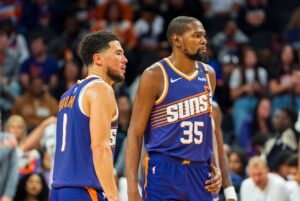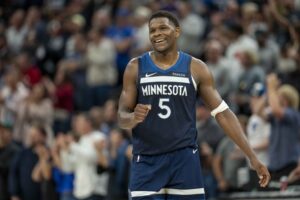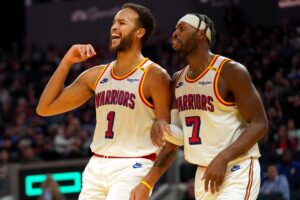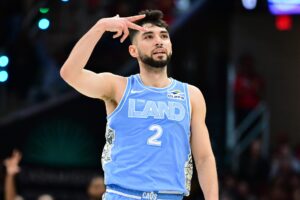The Philadelphia 76ers all-time team is a reflection of their storied past. Some of the most statistically dominant and culturally influential players have suited up for Philadelphia’s proud franchise. The starting lineup has all-time greats at every slot. One notable player is playing out of position, but he was so versatile that he could hold his own playing a different role. Besides, today’s league has shown that players don’t need to fit in rigid roles to succeed.
Philadelphia 76ers All-Time Roster – Starters
Point Guard – Allen Iverson
Nobody could argue otherwise. Allen Iverson’s career accomplishments coupled with his league-spanning cultural impact make him one of the most dynamic players ever to take the hardwood. After being picked first overall by the 76ers in the 1996 draft, Iverson went on to become Rookie of the Year, MVP, three-time steals leader, and a four-time scoring champion with the franchise. He also picked up six All-NBA selections in his ten-year run with the 76ers.
His style and attitude brought a sense of hip hop culture to a league audience that wasn’t always receptive. On the other hand, it was emblematic of the culture that a lot of players grew up in. In a sense, it was a precursor to the player empowerment era that we currently reside in. David Stern and the league tried to regulate Iverson and the league’s expression through fashion by enforcing a stricter dress code for game-day outfits. They tried to regulate the dress code to maintain control, but almost twenty years later players have more power than ever. Iverson was one of the first to step in that direction.
Shooting Guard – Julius Erving
Julius Erving is arguably the greatest Philadelphia 76er of all-time. Although he didn’t play his whole career with them, he led Philadelphia to their first title after the NBA merger of 1976. That 1983 team is still the last 76ers team to take home a championship. Julius Erving’s accomplishments get thrown under the rug because a lot of his success came in the ABA. He amassed three championships (two ABA, one NBA), seven All-NBA selections, five All-ABA selections, four MVP trophies (one NBA, three ABA) and 16 All-Star bids (11 NBA, five ABA) in his sixteen-year career.
He played Small Forward, so he’s slightly out of position at Shooting Guard. This shouldn’t be an issue though because he had enough offensive prowess to create buckets when his team needed. Erving was also an incredible off-ball defender, jumping passing lanes to anticipate steals and regularly executing chase-down blocks. The king of the ABA and one of the greatest NBA talents ever doesn’t often get his due. The least anyone can do is put him in the Philadelphia 76ers All-Time starting roster.
Small Forward – Charles Barkley
Charles Barkley occasionally played Small Forward in his NBA career. Basketball-Reference lists it as Barkley’s official position for three seasons from 1989-1992. Small Forward should be no issue thanks to his ample speed and relatively smaller size in the 6’5” range.
He was incredibly fortunate to land with the Philadelphia 76ers as a rookie in 1984. Joining the team allowed him to learn from two of the greatest ever in Julius Erving and Moses Malone. As an undersized big man, Barkley learned a ton from Malone in particular who was one of the greatest rebounders the league has ever seen. He put up averages of 23.3 points, 11.6 rebounds, 3.7 assists, and 1.7 steals in eight seasons with Philadelphia. The outspoken Barkley ended up requesting a trade out of Philadelphia after the 76ers failed to make the postseason. Regardless, he’s still too talented to leave off the starting roster.
Power Forward – Moses Malone
Moses Malone only played four seasons for the Philadelphia 76ers, but he was impactful enough to be considered one of the greatest 76ers of all time. He was the missing piece that brought the 76ers their first championship after the ABA-NBA merger.
He was arguably the greatest rebounder of all-time despite not even being the tallest Center at 6’10”. Malone’s base was strong, and he just had a natural feel for how the ball was going to ricochet off the rim. The big man averaged 21 points and 12 rebounds per game in his four years with the 76ers. In total, he collected six rebounding titles, eight All-NBA nods, two All-Defensive selections, 13 All-Star appearances, three MVPs, and the 1982-83 Finals MVP in 21 NBA seasons.
Center – Wilt Chamberlain
Wilt Chamberlain’s tenure with the Philadelphia 76ers was just as rocky as it was with every other team he was on. It was all validated by a 1967 championship over the San Francisco Warriors (now Golden State Warriors). Chamberlain didn’t average 50 points per game like he did with the Warriors, but was still a force for the 76ers. He put up averages 27.6 points, 23.9 rebounds, and 6.8 assists over four seasons.
Chamberlain ran into trouble versus the Boston Celtics all of his career, but as a 76er he did manage to capture one playoff series win against them. That was the victory broke the Celtics string of eight consecutive NBA titles, and led to the 76ers’ 1967 title. Philadelphia fans would’ve been happy if anyone broke the Celtics streak, but the fact that it was their team made it that much sweeter.
Philadelphia 76ers All-Time Roster – Bench
Point Guard – Maurice Cheeks
Maurice Cheeks didn’t blow up the box score, but he served admirably as the Philadelphia 76ers point guard from 1978-1989. Expectations weren’t high for the 38th pick of the 1978 NBA Draft, but he made a name for himself through hard work and consistency. He earned four All-Star berths in his playing days to go with five appearances on the All-Defensive team. Cheeks’ total career numbers are in the record books as he ranks fifth in steals all-time and eleventh in assists. He’s the team’s top facilitator on the 76ers All-Time team.
Shooting Guard – Hal Greer
Hal Greer was one of the 76er’s all-time greats, but he doesn’t get talked about because he played so long ago. Greer played for the 76ers before they were even called by that name. The Syracuse Nationals drafted Greer with the 13th pick of the 1958 NBA Draft. They turned into the Philadelphia 76ers after moving there in 1963.
Greer was a 10-time All-Star and seven-time member of the All-NBA Second Team in his 15-year career with the franchise. He brought the city their first championship with Wilt Chamberlain in 1967. Hal Greer was known for his quiet consistency. Every night he’d produce in the scoring department, pouring in career averages of 19.2 points, 5.0 rebounds, and 4.0 assists. While Wilt Chamberlain went to work unleashing his wrath on the 1960’s NBA, Hal Greer controlled the game as a humble leader.
Small Forward – Billy Cunningham
The 76ers have a few great Small Forward who could contend for this bench spot. Andre Iguodala and Bobby Jones are two that come to mind. Billy Cunningham takes it thanks to his contributions to the organization as a whole. He was a superb scorer and a crucial piece to the Philadelphia 76ers’ 1967 championship team. He averaged 20.8 points, 10.1 rebounds, and 4.0 assists over nine seasons with Philadelphia. Cunningham assumed the role of star player after Wilt Chamberlain left in 1968. He averaged 24.8 points and 12.8 rebounds per game the following year.
Cunningham even coached the 76ers for eight seasons after his nine as a player. That made him part of that 1967 championship team with Wilt Chamberlain and also the coach of the 1983 title team with Julius Erving. He undoubtedly deserves his place in the Hall of Fame and 76ers all-time team.
Power Forward – Dolph Schayes
Dolph Schayes played in an era (1950-64) that may have been less athletic than an anime convention, but his contributions are too important to overlook. Schayes landed on the Syracuse Nationals in 1949 and stayed with them until they became the Philadelphia 76ers in 1963.
He accrued 12 All-Star berths, 12 All-NBA nods, one rebounding title (1950-51), and the first championship in Nationals/76ers franchise history (1954-55). He was the go-to guy on their championship team and led them to the playoffs in 15 of 16 seasons played.
Center – Darryl Dawkins
Darryl Dawkins was a bruising Center who could absolutely bully people below the rim. He used to shatter backboards with his dunks, and one time ripped a toilet out of a locker room wall in a fit of rage. A guy with the nickname, “Chocolate Thunder” better have the strength to back it up.
Dawkins played an integral role in getting the 76er to three NBA Finals from 1977-1982. Unfortunately, he was ultimately traded because he couldn’t handle Kareem Abdul-Jabbar on the Los Angeles Lakers. They went on a tear once the 76ers acquired Moses Malone for Dawkins from the Houston Rockets via trade, winning the 1983 championship with ease. Just like how Toronto Raptors fans feel about DeMar DeRozan, Philadelphia 76ers fans still honor and respect all that Darryl Dawkins brought to the iconic franchise.
Main Photo
Embed from Getty Images






